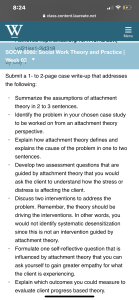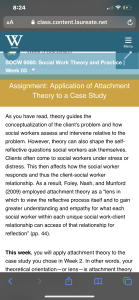SOCW 6060 Week 2 Assignment
SOCW 6060 Week 2 Assignment
SOCW 6060 Week 2 Assignment: Application of Systems Theory to a Case Study
The case study to use is Helen Petrakis. (attached)
In this course, you will be asked to select one case study and to use it throughout the entire course. By doing this, you will have the opportunity to see how theories guide your view of a client and the client’s presenting problem. Although the case may be the same, each time you use a different theory, your perspective of the problem changes, which then changes how you go about asking the assessment questions and how you intervene.
The first theoretical approach you will use to apply to a case study is systems theory. In other words, your theoretical orientation—your lens—will be systems theory as you analyze a social work case study SOCW 6060 Week 2 Assignment.

CLICK HERE TO ORDER SOCW 6060 Week 2 Assignment
Different theories can be used to take a systems approach. For example, Bertalanffy’s General Systems Theory considers how a system is made of smaller subsystems that influence each other and seek homeostasis, whereas Brofennerbrenner’s Ecological Systems Theory focuses on how an individual’s experience is influenced by different system levels (micro, meso, exo, macro, and chrono).
Systems theory is commonly used to understand the interrelationships of the systems (e.g., family, community, organizations, society) of the client. If you are working with families, communities, and organizations, it is also beneficial to use systems theory to get a holistic picture of all the interrelated parts of the system SOCW 6060 Week 2 Assignment.
To prepare: Select and focus on one of four case studies listed in the Learning Resources. You will use this same case study throughout the course.
By Day 7
- Focus on the identified client within your chosen case.
- Analyze the case using a systems approach, taking into consideration both family and community systems.
- Complete and submit the “Dissecting a Theory and Its Application to a Case Study” worksheet based on your analysis.
SOCW 6060 Week 3



Relational-Cultural Theory and Family Interventions Sample
Relational-Cultural Theory (RCT) prioritizes connections in relationships between family members and their psychology. It investigates the complexities of human interactions via the use of ideas like connectedness and disengagement, as well as identifying and analyzing the social impacts of the relationships. The cultural element highlights the impact of greater culture and power differentials on the quality and character of relationships and the consequences for harmonious cohabitation (McCauley, 2018). In a family with money-related and drug problems, psychological interventions using the relational cultural theory is important.
In the primary interventions, the reliability of family life is a substantial factor impacting health and habits throughout early life. Early deprivation has a significant impact on a child’s life path. Children with drug- or alcohol-dependent parents are at higher risk for eventual drug use. Taking these two factors into consideration are some of the primary interventions. Other primary interventions include discipline and family norms, essential in adolescence. Turnarounds or substantial disruption of family life can position any young individual at risk (Kisling & Das, 2022). Parents who are great listeners, establish realistic demands, supervise their child’s actions, and model positive perceptions and conduct have a protective effect.
Secondary intervention for the family includes screening, consultation, and referral for the parents and children for complications concerning abused drug interactions. Again, conducting motivational interviewing with the family children and teenagers of the family diagnosed with alcohol problems and who have initiated substance misuse is a secondary intervention (Kisling & Das, 2022). Instituting support groups that facilitate participants to share perspectives for aiding the family in rehabilitation is a tertiary intervention that can be applied to this family (Kisling & Das, 2022). Fostering prospects for peer assistance for those in rehabilitation to recognize positive coping skills is an essential tertiary intervention.
In applying relational cultural theory, people are assumed to have an intrinsic social character. Based on the premise that humans are socially constructed through connections, RCT acknowledges the intricacy underlying relationship development of the parents and children utilizing drugs. The theory claims that the relational nature of the family motivates them to grow through and toward connection (McCauley, 2018). Overall, family drug addiction translates to growth-promoting connections, which are defined as partnerships in which active engagement by all parties leads to reciprocal development of the same behavior. Such relationships lead to healthier workings and prospering or unhealthy functioning, as in this example.
References
Kisling, L. A., & Das, J. M. (2022). Prevention Strategies. In StatPearls [Internet]. StatPearls Publishing. https://www.ncbi.nlm.nih.gov/books/NBK537222/
McCauley, M. (2018). Relational-Cultural Theory: Fostering healthy coexistence through a Relational lens. Beyond Intractability. https://www.beyondintractability.org/relational-cultural-theory
Also read: NURS 6052 Week 6-7 Assignment Critical Appraisal Tools
